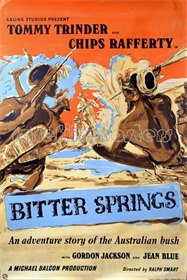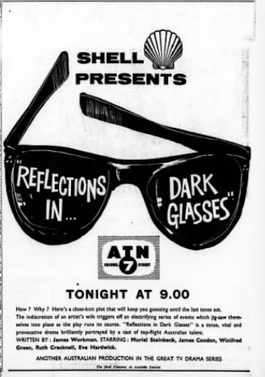Related Research Articles

Les Patterson Saves the World is a 1987 Australian comedy film starring Barry Humphries as his stage creations Sir Les Patterson and Dame Edna Everage.
John-Michael Howson is an Australian writer, reporter, entertainer and Melbourne radio commentator. His involvement in the Australian entertainment scene as a writer, producer and performer spans more than 50 years.
Frank Michael Howson was an Australian theatre and film director, screenwriter, and singer. He directed Flynn (1996) on the early life of Errol Flynn and Hunting (1991). Howson, with Peter Boyle, helped establish Boulevard Films which produced thirteen films from Boulevard of Broken Dreams (1988) to Flynn; besides producing for Boulevard Films, Howson often wrote scripts and directed.

Bitter Springs is a 1950 Australian–British film directed by Ralph Smart. An Australian pioneer family leases a piece of land from the government in the Australian outback in 1900 and hires two inexperienced British men as drovers. Problems with local Aboriginal people arise over the possession of a waterhole. Much of the film was shot on location in the Flinders Ranges in South Australia

Jucy is an Australian comedy feature film produced in 2010 about the womance between two best female friends. The film was written by Stephen Vagg, directed by Louise Alston and produced by Kelly Chapman. It is the second in a planned "quarter life crisis" trilogy from Vagg and Alston following the 2007 romantic comedy All My Friends Are Leaving Brisbane.

Up Jumped a Swagman is a 1965 British musical comedy film directed by Christopher Miles and starring Frank Ifield, Annette Andre, Ronald Radd and Suzy Kendall. It includes the songs "Waltzing Matilda" and "I Remember You".
Hunting is a 1991 Australian drama film written and directed by Frank Howson, starring John Savage, Kerry Armstrong and Guy Pearce.

The Time Guardian is a 1987 Australian science fiction film directed by Brian Hannant, co-written by John Baxter and Hannant, and starring Tom Burlinson, Nikki Coghill, Dean Stockwell, and Carrie Fisher.

Rebel is a 1985 Australian musical drama directed by Michael Jenkins and starring Matt Dillon, Debra Byrne, and Bryan Brown. It is set in World War Two.
Heaven Tonight is a 1990 Australian film.
Boulevard Films was an Australian production company which made a number of movies in the late 1980s and early 1990s, many which were set against a background of the entertainment industry.
Boulevard of Broken Dreams is a 1988 Australian film. It was the first movie from Boulevard Films.
What the Moon Saw is a 1990 Australian film directed by Pino Amenta. The first of five films Boulevard Films made following the success of Boulevard of Broken Dreams (1988), it was based on Howson's memories of being a child actor in the theatre.
Flynn is an Australian film about the early life of Errol Flynn, focusing on his time in New Guinea starring Guy Pearce in the title role.
Beyond My Reach is a 1990 Australian film starring Terri Garber. It was shot in Melbourne and Los Angeles.
Stanley is a 1984 Australian comedy film directed by Esben Storm and starring Peter Bensley and Graham Kennedy.
Doctors and Nurses is a 1981 Australian comedy film directed by Maurice Murphy. The gimmick is child actors play doctors and nurses and adults play patients.

"Reflections in Dark Glasses" is an Australian television film, or rather a television play, which aired in 1960. It aired as part of Shell Presents, which consisted of monthly presentations of stand-alone television dramas. It was written by Sydney writer James Workman, and is notable as an early example of Australian-written television drama. It was broadcast live in Sydney on 6 February 1960, then recorded and shown in Melbourne.

Light Me a Lucifer is a 1962 Australian television comedy film which aired on ABC. Written by John O'Grady, it starred Frank Thring as the devil, along with Wyn Roberts, Edward Howell, Joan Harris, Ken Goodlet and Lynne Flanagan. It was produced in Melbourne.
The Slaughter of St. Teresa's Day was a 1960 Australian TV play based on the stage play of the same name by Peter Kenna.
References
- ↑ "Australian Productions Top $175 million", Cinema Papers, March 1986 p64
- ↑ "TV.CHESS.X WORD". The Canberra Times (ACT : 1926–1995) . ACT: National Library of Australia. 5 January 1986. p. 12. Retrieved 24 December 2015.
- ↑ "Australian Films at the Australian Box Office", Film Victoria Archived 9 February 2014 at the Wayback Machine accessed 24 October 2009
- ↑ Vagg, Stephen (30 December 2019). "10 Aussie '80s Films That Attempted to Jazz Up Things with an Inappropriate Rock Soundtrack". Filmink.
- 1 2 3 4 "Producer and Writer Frank Howson on Laura Branigan, the Boulevard of Broken Dreams, the Art of Creation and more…". Cult Film Alley. 13 July 2019.
- ↑ "Pete Smith". The Australian Women's Weekly . National Library of Australia. 24 February 1982. p. 124. Retrieved 16 July 2013.
- 1 2 3 David Stratton, The Avocado Plantation: Boom and Bust in the Australian Film Industry, Pan MacMillan, 1990 p196-197
- ↑ Paul Kalina, "Boulevard Films", Cinema Papers, November 1989 p42-43
- ↑ David Stratton, "COMEDY OF HORRORS", The Sydney Morning Herald, 14 April 1988 p 12
- ↑ "Is there creative life after 10BA?". Filmnews (Sydney, NSW : 1975 – 1995) . Sydney, NSW: National Library of Australia. 1 May 1988. p. 8. Retrieved 24 December 2015.
- ↑ Vagg, Stephen (21 February 2024). "Frank Howson: The Unsung Auteur". Filmink.